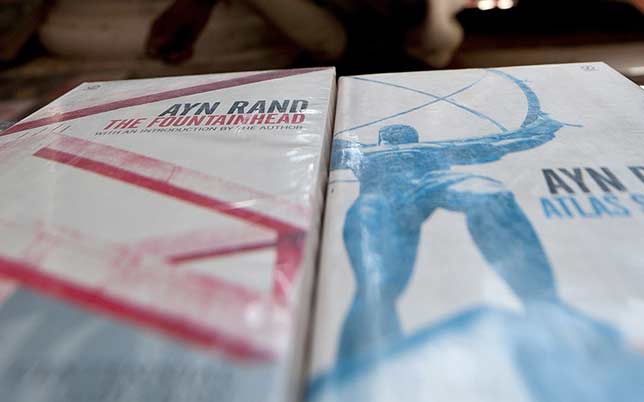
- Industry
Ayn Rand
Ayn Rand once worked as a stenographer at Paramount Pictures where her mentors were no less than Cecil B. deMille and Hal Wallis. It was a full decade before she published the book that has carried her fame to every corner of the earth, ‘The Fountainhead.’
Rand’s notoriety during the ’60s and ’70s stemmed from her vehement anti-communism. Liberals assumed that anyone that partisan must also be either pro-fascist or anti-semitic. Few at the time knew that she was born Alice Rosenbaum in St. Petersburg, Russia, that her parents were Jewish, and her “deliverance” in the US stemmed from her abhorrence of revolutionary ideas in Russia. She considered the United States the Promised Land, although as a confirmed atheist she would never invoke that Biblical allusion. She struggled to find work in this country and gain acceptance as a writer, finally achieving national prominence through her successful promotion of Objectivism, which advocated reason as the only means of acquiring knowledge.
By appearing in the sixties as a talk-show guest, where she had few peers, always articulate, logical, and spellbinding, she found ready converts, not the least of which was Alan Greenspan, the former Federal Reserve Chairman. Of course her place in history is secured by her two novels “The Fountainhead” and “Atlas Shrugged,” which continue to find not just enthusiasts but disciples, including future Republican standard-bearer Paul Ryan. Those novels, which sell 300,000 copies a year, may be mediocre fiction, but they are fraught with characters that espouse provocative ideas. Many of her best ideas are more relatable to the creative artist rather than the businessman. In her lifetime, she devoted her time to wooing the businessman. She really should have gone after the artist. It’s interesting that she herself wrote the screenplay for the movie version of “The Fountainhead,” condensing a thousand page novel into a two-hour drama.
By the way The Fountainhead (which if you haven’t seen it, rent it) is easily the most politically provocative movie EVER made in Hollywood. It still divides critics who consider it either high camp or sublime eroticism. The actors are all superb – Gary Cooper as Roark and Patricia Neal as Dominic, supported by Raymond Massey, Robert Douglas, Kent Smith, and Henry Hull, all ironically Warner contract “collective” players. Cooper and Neal fell in love during the making of the movie. At her HFPA press conference fifty years later, I asked Neal if she knew that Barbara Stanwyck had coveted the role, having brought the novel to Warner’s attention. (When Neal was given the role, Stanwyck ended her term contract with the studio.) “I didn’t know until much later. Someone told me that story. Still, I was pleased they got me instead of her. Some years later, after I won my Oscar (for Hud) and had my stroke, we were at the Beverly Hills Hotel, and she sent for me to come and sit at her table. She wanted to see me. I came and said hello, and she said, ‘What a great woman you are. You behave so fantastically,’ considering my stroke. I liked her so much. She was very good to me in the end.” Her love affair with Gary Cooper is the stuff of Hollywood legend. “I just loved Gary Cooper. I adored him. He was my love for… I will always love him. He was a beautiful man.” Footage from Rand’s many talk show appearances confirm her place as one of the most fascinating women of the 20th Century, articulate, fearless, and passionate. She may have been romanticized by her followers as an intellectual femme fatale, but she comes across as the prototypical Jewish intellectual. Watch those kinescopes.

